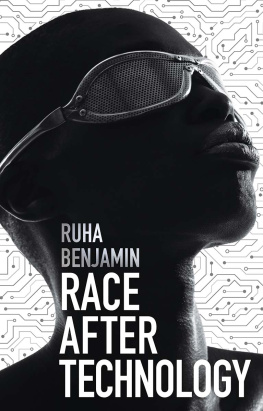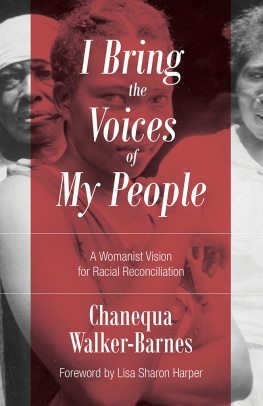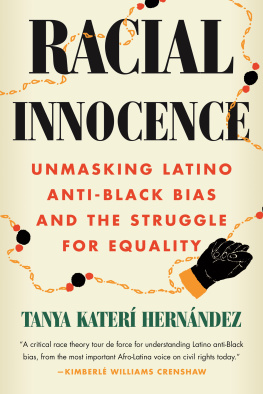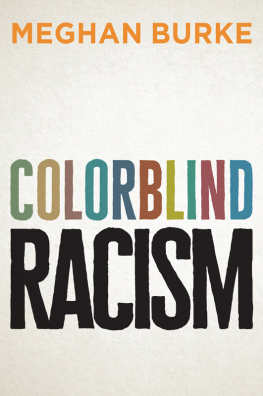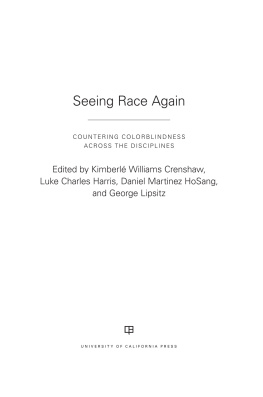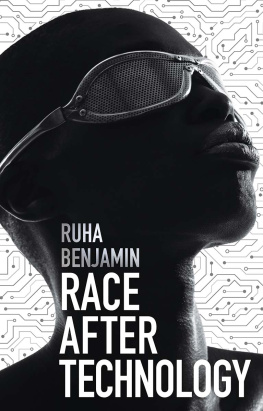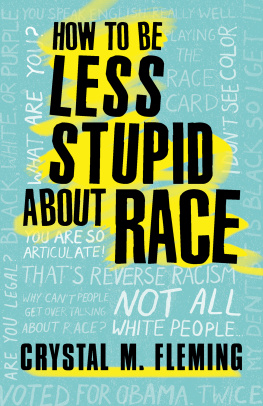
RACE AFTER TECHNOLOGY
Abolitionist Tools for the New Jim Code
Ruha Benjamin
polity
Copyright Ruha Benjamin 2019
The right of Ruha Benjamin to be identified as Author of this Work has been asserted in accordance with the UK Copyright, Designs and Patents Act 1988.
First published in 2019 by Polity Press
Polity Press
65 Bridge Street
Cambridge CB2 1UR, UK
Polity Press
101 Station Landing
Suite 300
Medford, MA 02155, USA
All rights reserved. Except for the quotation of short passages for the purpose of criticism and review, no part of this publication may be reproduced, stored in a retrieval system or transmitted, in any form or by any means, electronic, mechanical, photocopying, recording or otherwise, without the prior permission of the publisher.
ISBN-13: 978-1-5095-2643-7
A catalogue record for this book is available from the British Library.
Library of Congress Cataloging-in-Publication Data
Names: Benjamin, Ruha, author.
Title: Race after technology : abolitionist tools for the new Jim code / Ruha Benjamin.
Description: Medford, MA : Polity, 2019. | Includes bibliographical references and index.
Identifiers: LCCN 2018059981 (print) | LCCN 2019015243 (ebook) | ISBN 9781509526437 (Epub) | ISBN 9781509526390 (hardback) | ISBN 9781509526406 (paperback)
Subjects: LCSH: Digital divide--United States--21st century. | Information technology--Social aspects--United States--21st century. | African Americans--Social conditions--21st century. | Whites--United States--Social conditions--21st century. | United States--Race relations--21st century. | BISAC: SOCIAL SCIENCE / Demography.
Classification: LCC HN90.I56 (ebook) | LCC HN90.I56 B46 2019 (print) | DDC 303.48/330973--dc23
LC record available at https://lccn.loc.gov/2018059981
The publisher has used its best endeavours to ensure that the URLs for external websites referred to in this book are correct and active at the time of going to press. However, the publisher has no responsibility for the websites and can make no guarantee that a site will remain live or that the content is or will remain appropriate.
Every effort has been made to trace all copyright holders, but if any have been overlooked the publisher will be pleased to include any necessary credits in any subsequent reprint or edition.
For further information on Polity, visit our website: politybooks.com
Dedication
All my life Ive prided myself on being a survivor.
But surviving is just another loop
Maeve Millay, Westworld
I should constantly remind myself that the real leap
consists in introducing invention into existence
In the world through which I travel,
I am endlessly creating myself
I, the [hu]man of color, want only this:
That the tool never possess the [hu]man.
Black Skin, White Masks, Frantz Fanon
Notes
Toye 2016. Fanon 2008, p. 179.
Preface
I spent part of my childhood living with my grandma just off Crenshaw Boulevard in Los Angeles. My school was on the same street as our house, but I still spent many a day trying to coax kids on my block to play school with me on my grandmas huge concrete porch covered with that faux-grass carpet. For the few who would come, I would hand out little slips of paper and write math problems on a small chalkboard until someone would insist that we go play tag or hide-and-seek instead. Needless to say, I didnt have that many friends! But I still have fond memories of growing up off Crenshaw surrounded by people who took a genuine interest in one anothers well-being and who, to this day, I can feel cheering me on as I continue to play school.
Some of my most vivid memories of growing up also involve the police. Looking out of the backseat window of the car as we passed the playground fence, boys lined up for police pat-downs; or hearing the nonstop rumble of police helicopters overhead, so close that the roof would shake while we all tried to ignore it. Business as usual. Later, as a young mom, anytime I went back to visit I would recall the frustration of trying to keep the kids asleep with the sound and light from the helicopter piercing the windows thin pane. Like everyone who lives in a heavily policed neighborhood, I grew up with a keen sense of being watched. Family, friends, and neighbors all of us caught up in a carceral web, in which other peoples safety and freedom are predicated on our containment.
Now, in the age of big data, many of us continue to be monitored and measured, but without the audible rumble of helicopters to which we can point. This doesnt mean we no longer feel what its like to be a problem. We do. This book is my attempt to shine light in the other direction, to decode this subtle but no less hostile form of systemic bias, the New Jim Code.
Introduction
The New Jim Code
Naming a child is serious business. And if you are not White in the United States, there is much more to it than personal preference. When my younger son was born I wanted to give him an Arabic name to reflect part of our family heritage. But it was not long after 9/11, so of course I hesitated. I already knew he would be profiled as a Black youth and adult, so, like most Black mothers, I had already started mentally sparring those who would try to harm my child, even before he was born. Did I really want to add another round to the fight? Well, the fact is, I am also very stubborn. If you tell me I should not do something, I take that as a dare. So I gave the child an Arabic first and middle name and noted on his birth announcement: This guarantees he will be flagged anytime he tries to fly.
If you think I am being hyperbolic, keep in mind that names are racially coded. While they are one of the everyday tools we use to express individuality and connections, they are also markers interacting with numerous technologies, like airport screening systems and police risk assessments, as forms of data. Depending on ones name, one is more likely to be detained by state actors in the name of public safety.
Just as in naming a child, there are many everyday contexts such as applying for jobs, or shopping that employ emerging technologies, often to the detriment of those who are racially marked. This book explores how such technologies, which often pose as objective, scientific, or progressive, too often reinforce racism and other forms of inequity. Together, we will work to decode the powerful assumptions and values embedded in the material and digital architecture of our world. And we will be stubborn in our pursuit of a more just and equitable approach to tech ignoring the voice in our head that says, No way! Impossible! Not realistic! But as activist and educator Mariame Kaba contends, hope is a discipline. Reality is something we create together, except that so few people have a genuine say in the world in which they are forced to live. Amid so much suffering and injustice, we cannot resign ourselves to this reality we have inherited. It is time to reimagine what is possible. So lets get to work.
Everyday Coding
Each year I teach an undergraduate course on race and racism and I typically begin the class with an exercise designed to help me get to know the students while introducing the themes we will wrestle with during the semester. Whats in a name? Your family story, your religion, your nationality, your gender identity, your race and ethnicity? What assumptions do you think people make about you on the basis of your name? What about your nicknames are they chosen or imposed? From intimate patterns in dating and romance to large-scale employment trends, our names can open and shut doors. Like a welcome sign inviting people in or a scary mask repelling and pushing them away, this thing that is most
Next page
